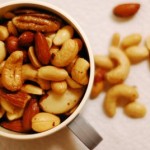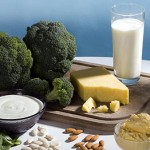 From the earliest stages of pregnancy through the nine months that follow, your growing baby depends on you for shelter and nourishment. Amazing growth is occurring. In just the first trimester, your baby will grow from a single cell to an easily recognizable fetus approximately 3 inches long comprised of billions of cells. As your baby grows, your blood volume increases, your uterus will expand and you will go through changes that might feel like they are taking all the energy you have. It only makes sense that the foods and drinks you choose to support this amazing journey are selected with consideration. You’ve likely heard many times that although you need more calories during pregnancy, eating for two or doubling your food intake is not necessary. Instead, thinking about making meaningful choices in your meals and snacks with foods full of vitality can provide reassurance that you are indeed doing what is best. Although all foods can fit into a prenatal diet and you definitely don’t have to strive to eat perfectly (an 80-20 approach is great: eat well at least 80% of the time), some foods and beverages are superstars during this time of life. Listed below are nine such choices – important throughout your entire pregnancy – with special significance to each month of your journey.
From the earliest stages of pregnancy through the nine months that follow, your growing baby depends on you for shelter and nourishment. Amazing growth is occurring. In just the first trimester, your baby will grow from a single cell to an easily recognizable fetus approximately 3 inches long comprised of billions of cells. As your baby grows, your blood volume increases, your uterus will expand and you will go through changes that might feel like they are taking all the energy you have. It only makes sense that the foods and drinks you choose to support this amazing journey are selected with consideration. You’ve likely heard many times that although you need more calories during pregnancy, eating for two or doubling your food intake is not necessary. Instead, thinking about making meaningful choices in your meals and snacks with foods full of vitality can provide reassurance that you are indeed doing what is best. Although all foods can fit into a prenatal diet and you definitely don’t have to strive to eat perfectly (an 80-20 approach is great: eat well at least 80% of the time), some foods and beverages are superstars during this time of life. Listed below are nine such choices – important throughout your entire pregnancy – with special significance to each month of your journey.
Month 1: Green leafies
Spinach and other leafy greens or ‘foliage’ supply folic acid. Folic acid is a B vitamin important early on for the development of baby’s neural tube. Ideally, 400 mcg or 0.4 mg of folic acid should be taken by supplement starting 2 or 3 months before conception. Other good sources of folic acid include oranges, orange juice, lentils, avocado, broccoli and other raw vegetables.
Month 2: Lemon-flavoured foods
Unfortunately, the first trimester is when you may experience nausea. Poorly understood, prenatal nausea is linked to hormonal changes. For most women, nausea is temporary. This still doesn’t make it any easier to deal with and you may be having trouble even feeling hungry let alone keeping anything down. For some women, the scent or taste of lemon can help reduce feelings of nausea. You may want to try lemon-flavoured yogurt (also gives you a calcium boost), a squeeze of lemon in a glass of gingerale or lemon juice drizzled on green vegetables.
Month 3: Yogurt
Yogurt is an excellent source of calcium, supplying 250 milligrams in a 175 g portion towards your daily goal of 1000-1500 milligrams. Consider a calcium supplement if you are having trouble getting this amount. Yogurt is an easy-to-digest, low prep snack. Choose yogurts with natural ingredients when possible.
Month 4: Water
At this point in your pregnancy you already have one third more blood volume than before conception. Ensure you stay well hydrated with plenty of water and hydrating fluids including real fruit juices, milk or soymilk and decaffeinated beverages. Note that less than 3 cups of coffee a day is considered okay – just don’t count this as hydrating fluids.
Month 5: Berries and Tropical Fruits
At this point in your pregnancy you will be feeling the effects of weight gain and even though pregnancy is a beautiful state to celebrate, you may not always feel so beautiful. Your energy level might be inconsistent too. When available, snack on fresh berries – blueberries, strawberries and raspberries. Combined with a little protein like yogurt, soft tofu or in a smoothie, berries provide an energizing treat supplying vitamins C and A. If berries aren’t available, enjoy a variety of tropical, richly-coloured fruit such as mangoes, papaya, kiwi fruit or pineapple. Even canned pineapple, in it’s own juice, provides a refreshing snack and is loaded with nutrients.
Month 6: Whole grains
You might find at month six that you are experiencing some constipation due to your growing baby putting pressure on your digestive system. Although choosing whole grains like brown rice and nice hearty whole-grain breads all the time is wise, this is an especially good time to ensure you are getting enough fibre. You will also be getting fibre by continuing to eat lots of fruits and vegetables. If you add extra whole grains to your diet, be sure to drink water to minimize any bloating.
Month 7: Healthy Fats
It’s interesting that at about 28 weeks, your baby will be laying down fat under his/her skin. If you haven’t already been focused on choosing good fats over the less healthy ones, work towards making some adjustments. Just like protein and carbohydrate, fat is a required nutrient in your diet. You just want to make it the good kind from foods like avocados, nuts and seeds, olive oil, fish oils or flax seed. Less healthy fats are those in foods that have been deep-fried or have had hydrogenated oils added in processing.
Month 8: Chocolate
What kind of nutritionist recommends chocolate? We’ve added this point in to remind you that a few little indulgences are okay (remember the 80-20 rule), but more so as a reminder about choosing quality foods. Good quality, dark chocolate actually supplies minerals, including magnesium important for energy and preventing cramps. There is a difference though in good quality chocolate and the lower quality chocolate providing saturated, less healthy fats. If you are craving a treat, go ahead and indulge, but do think about the quality and portion control. A cup of real hot chocolate made of cocoa and low fat milk is a healthier choice than a commercial hot chocolate mix.
Month 9: Quality Protein
Three daily servings of protein (3-4 ounces each) are important throughout your whole pregnancy. Protein at this stage can help in the management of heartburn that might be occurring. Protein, when consumed in all meals and in smaller amounts with snacks, can help increase the pressure on the flap that prevents food from fluxing back up your esophagus from your stomach. Soy, tofu, skinless chicken, fish, eggs, nuts and natural peanut butter are amongst the better choices.









